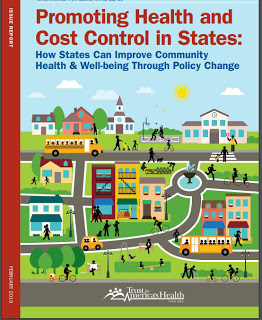Policy can often improve a state’s health more than healthcare; report offers 13 policies known to work, Ky only does 6

By Melissa Patrick
Kentucky Health News
Improving a state’s health outcomes and lowering healthcare costs often has less to do with health care and more to do with implementing a range of policies that are known to have long-term impacts on health, such as smoke-free policies and universal pre-kindergarten programs. So says a new report which shows that Kentucky is only implementing six of the 13 suggested policies.
“The United States is spending more and more on healthcare services to treat disease. Yet spending on the drivers of good health — quality housing, healthy foods and education — is stagnant,” says the reportfrom Trust for America’s Health, Promoting Health and Cost Control: How States Can Improve Community Health and Well-being through Policy Change.
“Residents of other countries that have higher ratios of spending on social services to spending on health care services have better health and live longer despite the U.S. spending more money per capita on medical services than any other country,” says the report. It analyzes state action on 13 policies that are known to have long-term impacts on health and are based in evidence that shows their effectiveness.
To create the report, researchers reviewed about 1,500 evidence-based programs and strategies and then chose the 13 that had the strongest health impacts, showed economic evidence of impact, focused on prevention at the community level, and could be implemented by state legislative action.
The detailed report identifies policies that leverage the connection between health and learning, promote healthy living through the built environment, foster healthy behaviors, support healthy and affordable housing, and create economic opportunities. In addition to the suggested policies to improve health, the report also offers complementary policies for each of these categories.
As of Dec. 31, 2018, Kentucky had implemented six of the 13 suggested policies: a competitive foods policy, which sets nutritional standards for schools; a tobacco tax (though it is well below the national average); an alcohol tax; a housing rehabilitation loan-and-grant program for low-and median-income families; and has fair-hiring protections that include a measure that is often called “ban the box,” which removes conviction-history questions on job applications.
Also, Kentucky leads the nation in the number of syringe exchanges, which the report says offer a long-term return of $7.58 for every $1 invested, by lowering HIV rates and reducing treatment costs, plus tremendous savings for averting cases of hepatitis C, which is very expensive to treat.
That leaves seven policies for Kentucky to work on, form the report’s point of view.
Kentucky does not have a universal pre-kindergarten program, which the report defines as publicly funded preschool offered to all 4-year-old children with no eligibility requirements. The report says that high quality pre-K education programs can generate $4.63 in benefits to participants, taxpayers and others for every $1 spent on such programs. Also, Kentucky does not require all schools to offer a school breakfast or lunch program.
Kentucky also does not have a statewide indoor smoke-free policy, and is not likely to get one in the near future, since Gov. Matt Bevin has said he believes this is a local issue. However, there has been some movement on a bill to make all school properties and events tobacco-free this year, but it’s uncertain if it will pass since it’s hit a snag in the full House over issues of “government overreach.”
Also, Kentucky does not have an earned-income tax credit; policies that support paid sick leave or paid family leave; policies supporting the concept of “complete streets,” an approach to transportation that addresses the needs of all road users, such as walkers and bicyclists; rapid “re-housing” laws, which help homeless people move quickly into permanent housing.
In a state that persistently ranks in the bottom 10 states for almost every health measure, and that for three straight years has shown a significant increase in the number of years of potential life lost — a broad measure of overall health and life expectancy — this report offers evidenced-based suggestions for policies that if enacted could make a real difference in the health and economy of the state.
“Action is imperative,” said John Auerbach, president and CEO of Trust for America’s Health. “As a nation, we spend trillions of dollars a year on healthcare and yet Americans are getting less healthy. The solution is two-fold: direct more spending to prevention efforts and address the social determinants of health instead of their impact after someone is sick.”
The Robert Wood Johnson Foundation and Kaiser Permanente provided financial support for this project.